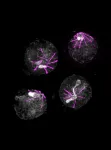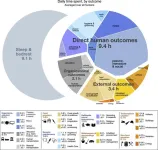(Press-News.org)
In the cerebral cortex, neurogenesis – the formation of neural cells from stem cells – begins in the fetus from 5 weeks gestation and is almost complete by 28 weeks. It is a complex process with finely tuned mechanisms. “In humans, neurogenesis lasts particularly long compared with other species, explains Khadijeh Shabani, a post-doctoral researcher at Paris Brain Institute. Neural stem cells remain in a progenitor state for an extended period. Only later do they differentiate into glial cells, astrocytes, or oligodendrocytes that will form the architecture of the brain and spinal cord.”
Until now, researchers did not know how this balance between stem cell proliferation and differentiation into several cell types was regulated. Above all, they ignored whether the exceptionally long-time span of human neurogenesis could pave the way for vulnerabilities specific to our species, such as neurodegenerative diseases. To better understand how our brains are shaped during this crucial period, researchers from the "Brain Development" team led by Bassem Hassan at Paris Brain Institute investigated.
APP, conductor of neuronal production
“We were interested in the amyloid precursor protein, or APP, which is highly expressed throughout the development of the nervous system, Hassan says. It is an exciting research target as its fragmentation produces the famous amyloid peptides, whose toxic aggregation is associated with neuronal death observed in Alzheimer's disease. We, therefore, suspect that APP may play a central role in the early stages of the disease.”
In many species, APP is involved in various biological processes, such as repairing cerebral lesions, orchestrating cellular response after oxygen deprivation, or controlling brain plasticity. It is highly expressed during the differentiation and migration of cortical neurons, suggesting an essential role in neurogenesis. But what about humans?
To track APP expression during human brain development, the researchers used cell sequencing data obtained from the fetus at ten weeks and then 18 weeks gestation. They observed that the protein was first expressed in 6 cell types, then, a few weeks later, in no less than 16 cell types. They then used the CRISPR-Cas9 genetic scissors technique to produce neural stem cells in which APP was not expressed. They then compared these genetically modified cells with cells obtained in vivo.
“This comparison provided us with valuable data, Shabani explains. We observed that in the absence of APP, neural stem cells produced many more neurons, more rapidly, and were less inclined to proliferate in the progenitor cell state.” Specifically, the team showed that APP was involved in two fined-tuned genetic mechanisms: on the one hand, canonical WNT signaling, which controls stem cell proliferation, and AP-1 activation, which triggers the production of new neurons. By acting on these two levers, APP is able to regulate the timing of neurogenesis.
Human neurogenesis, all too human
While the loss of APP strongly accelerates brain neurogenesis in humans, this is not the case in rodents. “In mouse models, neurogenesis is already very fast – too fast for APP deprivation to accelerate it further. We can imagine that the regulatory role of this protein is negligible in mice, while it is essential in the neurodevelopment of our species: to acquire its final form, our brain needs to generate huge quantities of neurons over a very long period, and according to a definite plan. APP-related abnormalities could cause premature neurogenesis and significant cellular stress, the consequences of which would be observable later, suggests Hassan. Moreover, the brain regions in which early signs of Alzheimer's disease appear also take the longest to mature during childhood and adolescence.”
What if the timing of human neurogenesis was directly linked to the mechanisms of neurodegeneration? Although neurodegenerative diseases are generally diagnosed between the ages of 40 and 60, researchers believe that clinical signs appear several decades after the onset of decline in certain neuronal connections. This loss of connectivity may itself reflect anomalies at a molecular scale present from childhood or even earlier.
Further studies will be needed to confirm that APP plays a central role in the neurodevelopmental disruptions that pave the way for Alzheimer's disease. In which case, we could consider that “these disturbances lead to the formation of a brain that functions normally at birth but is particularly vulnerable to certain biological events – such as inflammation, excitotoxicity or somatic mutations – and certain environmental factors such as a poor diet, lack of sleep, infections, etc., adds the researcher. Over time, these different stresses could lead to neurodegeneration – a phenomenon specific to the human species and made particularly visible by the increase in life expectancy.”
END
With almost 250 million cases a year, 621,000 of them fatal, malaria remains a major public health problem, particularly in sub-Saharan Africa. Malaria is a parasitic disease transmitted by mosquitoes and caused by a microbe of the genus Plasmodium. On its journey from mosquito to human, Plasmodium must adapt to the specificities of the many organs and cells it parasitizes. Microbes do not have sensory organs; instead, they have sensors made of proteins to detect molecules specific to the environments they colonize. While most living organisms share the same types of sensors, Plasmodium is an exception. Biologists at the University of Geneva (UNIGE) have identified a new type ...
The use of thyroid hormones other than the commonly prescribed hormone medicine levothyroxine to treat hypothyroidism, or underactive thyroid, is increasing, according to a study being presented Friday at ENDO 2023, the Endocrine Society’s annual meeting in Chicago, Ill.
“This is significant because the long-term health outcomes of these treatments are not as well known as levothyroxine,” said researcher Matthew Ettleson, M.D., of the University of Chicago in Chicago, Ill.
The thyroid makes the hormones triiodothyronine ...
CHICAGO—The percent of metabolic associated fatty liver disease (MAFLD), the leading global cause of liver disease, is increasing in U.S. adults, according to a study presented Friday at ENDO 2023, the Endocrine Society’s annual meeting in Chicago, Ill.
Mexican Americans consistently had the highest percentage of MAFLD, especially in 2018, although the prevalence of increase was higher among Whites, the study found.
MAFLD, previously known as non-alcoholic fatty liver disease (NAFLD), is fast becoming the most common indication ...
Everyone has 24 hours per day. Across the global population of 8 billion people this adds up to approximately 190 billion human hours per day. How those hours are spent determines the impacts we have on our surroundings as well as how we experience life. To find out how people around the world use their time, a research team led by McGill University has gathered and analyzed information about both economic and non-economic activities in order to estimate, for the first time, what a day in the life of the world looks like.
“At present, we are struggling to come to terms with global challenges, and that calls for fresh perspectives on how the world ...
The European Commission's stated aim is to improve access to innovative drugs at the national level throughout the EU. Firstly, according to the proposal for the reform of EU pharmaceutical legislation, there are still considerable differences in access between countries. Secondly, drug development has so far only been geared to a limited extent to the actual needs of patients. According to the German Institute for Quality and Efficiency in Health Care (IQWiG), the latter point is in line with the perspective of the ...
Findings highlight racial disparities in sudden unexpected infant death in the U.S.
Only 16% fathers followed all three AAP-recommended infant sleep practices
Rates of breastfeeding initiation and breastfeeding at eight weeks were much higher among fathers who wanted their infant’s mother to breastfeed than those who did not or had no opinion
CHICAGO --- Fathers can make a huge difference in whether an infant is breastfed and placed to sleep safely, according to a recent survey of new fathers led by scientists at Northwestern University and the Ann & Robert H. Lurie Children’s Hospital of Chicago.
The study included 250 fathers who ...
In an article published yesterday in the prestigious journal Science, leading researchers from the University of Waterloo, University of Toronto, Yale University and the University of Pennsylvania look at how AI (large language models or LLMs in particular) could change the nature of their work.
“What we wanted to explore in this article is how social science research practices can be adapted, even reinvented, to harness the power of AI,” said Igor Grossmann, professor of psychology at Waterloo.
Grossmann and colleagues note ...
‘Weed early and often’ is the key to a productive garden. Interestingly, certain species of ants are also avid gardeners, a practice they’ve refined over 50 million years. They too weed their underground fungus gardens, but how they know what to weed out has been a mystery. Now, a multidisciplinary team of scientists report in PNAS on June 15 how ants distinguish the good fungus from the bad.
People rely on sight to identify weeds but ants grow fungus underground in the dark and must have other ways to sense undesirable garden denizens. A team led by Jonathan Klassen, Ph.D., at the ...
Biological treatment processes are critical for sewage purification, wherein microbial interactions are tightly associated with treatment performance. Previous studies have focused on assessing how environmental factors (such as salinity) affect the diversity and composition of the microbial community but ignore the connections among microorganisms. To fill this gap, an international team of researchers conducted an in-depth analysis of microbial interactions at elevated salinity in activated sludge systems.
Biological ...
HOUSTON – (June 16, 2023) – Rice University chemist Anatoly Kolomeisky has won an award from the National Science Foundation to investigate how heterogeneity affects chemical and biological processes. The goal of his project is to develop analytical models that quantify the role of heterogeneity in various phenomena including catalytic reactions, antimicrobial peptides, early cancer development and lysis, a process describing cellular membrane breakdown.
“We live in a world of heterogeneity,” ...


